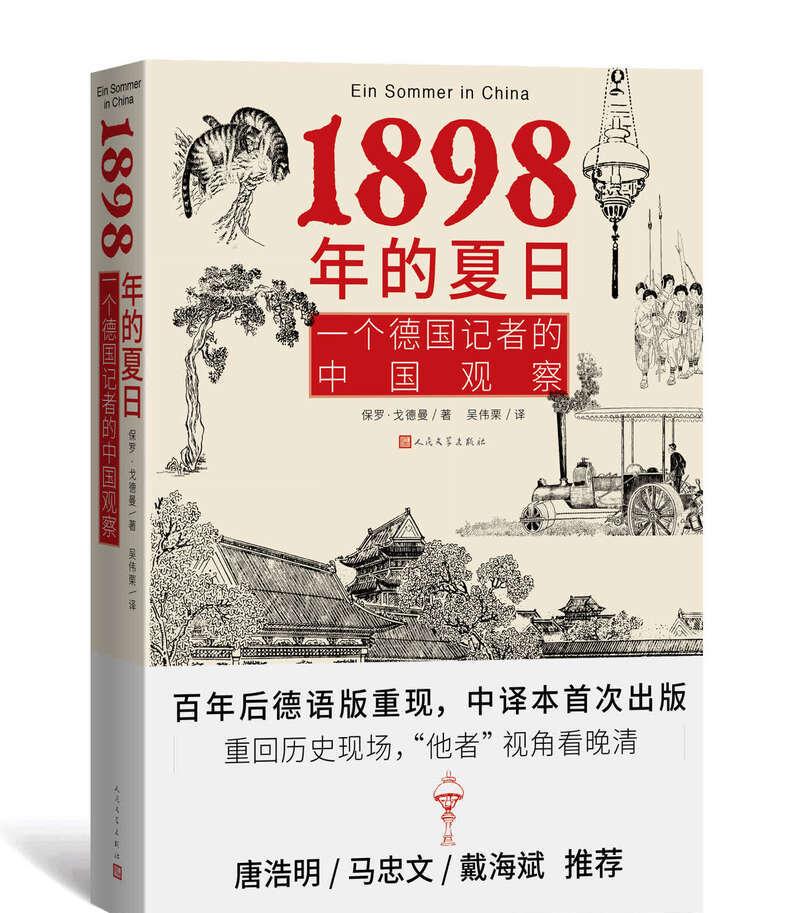China Youth Daily Client News (China Youth Daily, China Youth Network reporter Jiang Xiaobin) 1898 is an important year in China's modern history. A revolution shook the whole country and is still a hot topic in historiography. On March 6, 1898, the Qing government signed the Jiao'ao Lend-Lease Treaty with Germany, and on April 10, the German journalist Paul Goldman was assigned by the Frankfurt Newspaper to conduct interviews with China from the Port of Geniana, Italy.

With the acumen of a journalist and the writing style of a writer, Goldman recorded the customs of Hong Kong, Guangzhou, Shanghai, Hankou, Wuchang, Jiaozhou, Tianjin, Beijing and other cities in the late Qing Dynasty, which has a sense of picture. These texts are collected into "Summer day of 1898: A German journalist's Observations on China", a Chinese translation that was recently published by the People's Literature Publishing House for the first time.
After setting off on the German "Prussia" long-distance mechanical ship, Goldman crossed the Mediterranean Sea, through Egypt, the Suez Canal, the Gulf of Aden, and sailed to singapore, a European-style oriental new city. Then, he landed in Hong Kong, through Guangzhou, Shanghai, and all the way to the hinterland of China for a detailed investigation. On the way, he interviewed Wang Cunshan, then secretary of the Governor of Guangdong and director of the Lijin Bureau, and Cai Jun of Shanghai Daotai. From Shanghai, take a boat down the Yangtze River and stop at Zhenjiang, Hankou, Wuchang and other places.
In Hankou, Goldman visited the commercial institutions and monasteries established in Chinese mainland in Europe. In Wuchang, he inspected the new type of army trained by German instructors hired by Zhang Zhidong, the governor of Huguang. In Qingdao, Weihai, Zhifu (Yantai) and other places in Jiaozhou Bay, he visited the Jiaozhou area that had just been incorporated into the German concession.
Goldman met many modern Chinese historical figures during his visit. In Yantai, he met Chen Jitong, a former Qing government diplomat in Europe. This is an important figure in modern history who has vigorously promoted Chinese culture in Europe. In Tianjin, he interviewed Rong Lu, the Qing government's army chief and governor directly under him. In Beijing, he visited Li Hongzhang, who had just left the wilderness. His recognition of the Chinese people and the Chinese people is also very high, which is invaluable under the historical conditions at that time.
What is particularly valuable is that in the book, Goldman highly affirms the diligence, bravery and wisdom of the Chinese people he has come into contact with. He predicted at the time that Shanghai would become a great city in the East with decades of efforts. This prophecy is now a reality.
In the book, Goldman also revealed the inside story of the capital competition of the European powers in the initial Process of China's railway planning, as well as the situation that China's economy and the European economy are integrated and the European economy and the conflict of interests between the great powers.
After a hundred years, this book can be discovered, translated, and published, which is also meaningful and valuable. Some netizens even compared the historical value of this book with "Marco Polo's Travels" and Snow's "Red Star Shines on China" as the best among the books written by foreigners in China.
As a German journalist, Paul Goldman is friendly to China, and his position and integrity on major historical issues such as opposition to the Nazis are also admirable. But we must also note that in this book, after all, he looks at China from the perspective of Germany, and sometimes it is inevitable to reveal some racial arrogance, and even occasionally the tone of a colonizer. This is clearly a historical limitation.
Read history to Ming Zhi. Looking at today, our lives have undergone earth-shaking changes, and the ancient China, which has suffered many disasters, has finally shaken off the doom of being subject to people and ushered in a new and exciting situation. China and the world are in a community of common destiny, and we need historical communication, cultural communication, the elimination of prejudices, and mutual respect. This is also another value and significance of such a historical work published today.
Source: China Youth Daily client